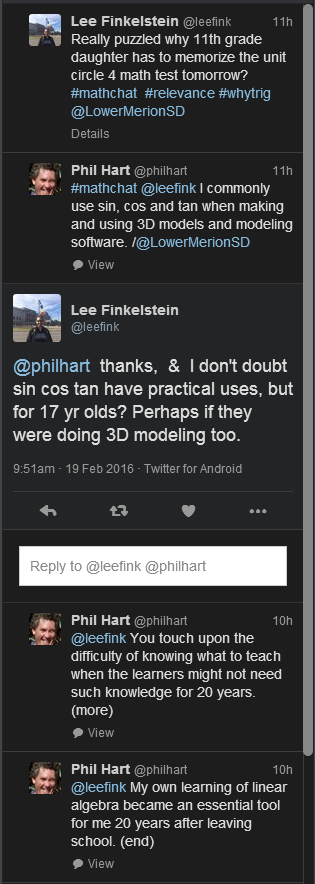Acknowledgment
The inspiration for this post comes from Lee Finkelstein (Twitter: @leefink) with a tweet that resulted in the following exchange:

and it raises the question of why mathematics is taught in schools. The rest of this post shares my ideas on this question.
Assumptions Revisited
It seems to me that one of the purposes of schooling is to equip students with the knowledge, skills and attitudes to function effectively as adults once they leave school. It also seems to me that different students have different aptitudes and interests, and this has impact both on their performance at school and their learning. There is also the observation students will be “going into the world” where there will be jobs that do not exist at the time of their schooling.
Using Lee’s cri de coeur about why his 11th grade daughter needed to memorize things about the unit circle as a starting point, it is worthwhile commenting that every subject at school has relationships with other subjects, even though they tend to be taught in isolation from each other at high school. By way of example, mathematics is an essential component of the high school subjects chemistry, physics and engineering drawing. Mathematics is also an enabling tool for vast numbers of jobs in the workplace. Similar comments apply to the study of language its relationship with the workplace.
Speaking from personal experience, there were subjects that “bored me rigid” at school. It was not until well into my own adult life that I developed an interest in some of those subjects.
Discussion
The above raises the thorny and perennial question of what, and perhaps to a lesser extent when and how, educators (and by this I include non-teachers as well) should decide what should be learned. I have no answers to this question. All I can do in this context is to mention ideas and raise issues for other people to ponder and perhaps come up with their own answers.
It now seems appropriate to offer some personal experiences. When it comes to mathematics, its relevance to me was that I found it engaging for its own sake. There were three areas in particular (quadratic equations, linear algebra and statistics if you must know) that proved to be invaluable 20 years later, and saved my then employer in the region of US $10M/year. I found history and geography to be as dry as dust, and it was not until I explored the countries of western Europe as an adult that what little I had learned as a child served as an invaluable basis for learning about, and more to the point understanding, what it was that I was looking at.
Finally
I must now leave it for you, dear reader, to respond with your comments below. I look forward to hearing from you.